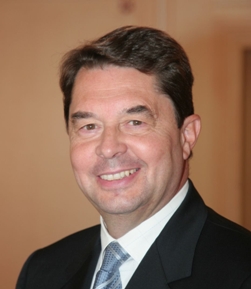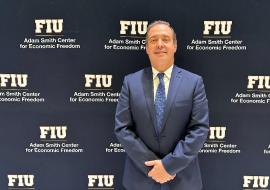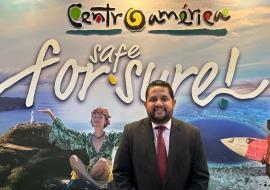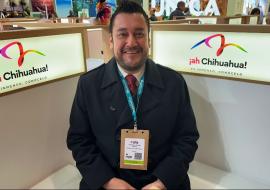Q & A with Carlos Vogeler, World Tourism Organization’s Regional Director for the Americas (UNWTO)

World economic crisis has opened important opportunities to the tourism sector, but in order to take advantage of them it’s vital to understand the diverse functions of governance in the framework of national tourism policy and decision making. This will be the main subject to be analyzed in the meeting of tourism ministers, parliamentarians, local authorities and representatives from the private sector, during the next Forum for Parliamentarians and Local Authorities, to be held in Puerto Vallarta (Mexico), and Mr. Vogeler talked about this much in an exclusive interview with CND.
When is this forum going to be held?
November 16-18; it kicks off at noon on November 16, and Mexico’s Tourism minister, Gloria Guevara, will be there as well as our UNWTO general secretary, and we’re waiting confirmation from Filipinas’ tourism minister, because the forum’s previous edition was carried out in that country.
Why Puerto Vallarta?
It’s mainly because Mexico’s government and Jalisco State were very interested in Puerto Vallarta to welcome the forum. The options were Guadalajara or Puerto Vallarta and this one was chosen since it’s a first-level tourism center and that’s a way of putting it in the map, besides a magnificent convention center was built there and it’s about to open its doors, in fact, the international forum of migration and development will be in session in that facility next week. That’s why Puerto Vallarta was chosen.
What’s going to be the spirit in the forum?
Meetings organized by UNWTO are usually within the circle of tourism representatives, including national administrations or any other government or private sector representative. That’s why, the spirit of these forums, which are aimed at parliamentarians and local authorities, is promoting an opening to other sectors, since tourism is a quite transversal activity, they have a lot to do with the industry, even if they’re not fully aware of that fact. It’s a way of raising their consciousness about tourism as horizontal activity, where decisions made in parliaments or actions carried out by local governments have a significant impact, considering that many countries have executed processes of commissions decentralization. So, the forum will deal with the situation of world economy and how the tourism industry has made it through this period of crisis; on the other hand, tourism governance will also be debated from the viewpoint of its position in institutions of different executive and legislative powers. Where tourism departments are located, in what ministry, or what are the centralization or decentralization policies that have been applied in different countries and how positive or negative have these policies been.
We later analyze the contribution of tourism to the sustainable development and that’s linked to the millennium’s development objectives, how is tourism contributing with those objectives in order to alleviate poverty, promote genre equality and the development of local communities.
We’ll be also talking about consumers protection and travel facilitation, matters related to alerts on risks in certain destinations and how real they are, we’ll discuss matters linked to our ethical code on world tourism, and we’ll put on the table concrete experiences such as the Icelandic volcano and perhaps the need of an international agreement for that kind of situation, which should be signed by different countries.
Another outstanding subject is the partnership between public and private sectors, and how could a better tune between them contribute to improve competitiveness and development. These topics have a lot to do with the current situation faced by tourism and they will involve actors who do not always feel they play a leading role in tourism activities, people such as parliamentarians who obviously reach different matters and local, municipal, regional and provincial authorities.
I see you’re dealing with outstanding issues, but culture isn’t included, which is one of the key elements in our new vision of tourism…
It isn’t specifically included in one session, but it is indirectly present in the session we have related to sustainable development and the millennium’s objectives, because among the elements to be debated it’s clear that communitarian and culture tourism, especially in America, autochthonous cultures, authenticity, which is one of the top elements searched by the new tourist, are extremely important, and these issues will be present in our session on sustainability and development, because we talk about it in four levels: economic, social, environmental and cultural.
You’ve just returned from Central America and you’ve visited other countries, Costa Rica and Guatemala. How do you see the development of the region in terms of tourism?
I think it’s positive. In Costa Rica and Guatemala I had the chance to interact with governments, mass media and the private sector, which are key elements in this process. I was talking in Guatemala about the importance of correctly coordinating the four legs of the table to support the development of tourism: public sector, private sector, mass media and the academic or training sector. They must work in tune.
I see in Central America a very positive trend: first of all, there is a political stability which was historically forgotten in the region and it’s been in position for over 20 years. Second, the process of Central American integration is encouraging the development of tourism. There’s a clear political will in every Central American country of working together and applying facilitation measures for tourists, and that’s bringing about very positive results. The prove is that the region, in 2010, has grown in 9% of international tourism, which is above the average of world growth.
Besides the cultural and historical resources the region has to offer and satisfy the new tourist, we’re looking for more authenticity, experiences and a series of characteristics present in Central America. It’s certainly facing challenges, such as infrastructures, air extensibility, security; but what I’ve verified in both Costa Rica and Guatemala –and I know it’s the same in other countries because I’ve felt it-, is the political will. We’ve seen from the higher ranks in the State a clear political will aimed at tourism, so it becomes part of a State policy.
Speaking of Central America, Panama was a non-tourism destination some time ago; it was a sort of commercial destination. How do you sense the position of the new ministry and government President who are trying to widely open the country?
It’s a highly valuable example since Panama is applying a very interesting dynamic, the government has a business character, if we can name it so, with a quite practical and executive view of issues, and that’s translated into actions and it can be felt in terms of tourism. Next year, they’ll put the tourism fair of Central America on hold, among the current fair rotation. There’s a close partnership between public and private sectors, which is boosted by the new government’s nature, and it’s clear they are willing to become the tourism industry into one of the development axis of the country. It also counts on a series of elements and resources – whether natural or man-made – not only the attractive canal, but everything commerce entails, business activity around Panama, as we shouldn’t forget that business tourism itself is a significant market niche, and Panama has it pretty well oriented in that sense.
I want to know what do you think about America and the Caribbean regarding to the opening of regional and internal markets as outbound markets for them, and the advantage that international markets might have receiving that tourism, which is not only ethnical, but it’s an important cultural tourism, and there is the study tourism since many students come to Europe and Spain in order to conduct master’s degrees and specializations. How does the UNWTO support governments and up-and-coming countries in the world of tourism, not only in Latin America but the Caribbean, and linguistically speaking, what the English-speaking Caribbean CARICOM is all about? How are they moving forward? What are the most important associations?
The question is pretty well focused, since there is actually a difference between an English-speaking Caribbean and a Hispanic Caribbean, two geographically close worlds but very distant from each other. We’re dealing with that situation through a bilateral way, for instance, we have a strong relation with English-speaking Jamaica and Bahamas, where we’re tirelessly working with two active tourism ministries. As Hispanic Caribbean we are mainly working with Cuba and the Dominican Republic. Haiti is going through an extremely complicated situation, it has unfortunately never been in the world tourism map, in spite of its natural resources which would turn it into a first level destination, but I use case as an example of Caribbean unity.
As a result of the earthquake, we had a meeting with the tourism minister of Jamaica and we formed a group – an initiative we named Montego Bay group-, integrated by Caribbean countries, Dominican Republic, Cuba and English-speaking countries, so as to create a support group which was in contact with Haiti’s minister of tourism to work together and provide help, so tourism would be a key element in Haiti’s recovery. President Preval had already declared that it was important to boost two areas, agriculture and tourism.
This is an example of cohesion, we still have a lot to do, but models have been already created where the English-speaking Caribbean is joining the Hispanic part and Haiti, which we wanted to be integrated with the rest of the region. There are other institutions dealing with that issue; one of them is CTO (Caribbean Tourism Organization) which is more focused in the English-speaking circle, and Hispanic courtiers might feel some difference in that case.
Sorry, you’ve said Jamaica and Barbados, but you’re talking about CTO and CTO is Barbados, along with the headquarters in New York. Those are the real bases of CTO.
Well, that’s because those are the places where CTO’s main executives are based, but you can’t certainly deny that Barbados is the country providing more support to the headquarters. When we talk about what we’re working on, we’re trying to interact with CTO so it turns open for other countries and the non English-speaking Caribbean, not only insular but continental. There is work to do.
In the framework of UN, obviously with CARICOM, and within that sphere, the organizations are strengthening relations with CARICOM so tourism gains presence. We’re also promoting the relation with the OAS (Organization of American States), and we’re holding talks with them about an event they’ll carry out related to risks and crisis in the Dominican Republic, and we’re trying to participate.
This is all about the mobilization and bridges we’re establishing with different institutions so the Caribbean becomes more united, compact and it works its image of joint brand. Caribbean countries have a significant problem to beat, the interinsular air accessibility to create multidestinations, specially aimed at outbound markets, Europeans for instance, and that’s why it’s necessary to introduce united products, but air accessibility is an obstacle. There’s a lot to do, but we’re establishing bases.
In your opinion: what would be the first measures to be implemented so as to globalize the Caribbean with a not only English-speaking and American vision, but a vision which would be more opened to Hispanic and Portuguese-speaking countries?
Well, we’re not here to give lessons to anybody, as an UN international organization we observe the situations, we provide support and help, but I believe that integration would be the right measure to be taken. The Caribbean is a region that, as we’ve said, is mainly formed by an English-speaking community and a Hispanic one. So it acts united, an integration between both communities must be encouraged, which would be one of the first steps. I’ve talked about it with the CTO general secretary, as a result of dialogues I’ve had with tourism ministers from the non English-speaking area, which have expressed their viewpoint regarding to the convenience of CTO joining the Hispanic world. I think that would be the first measure, to achieve that integration level. It’s also true that a significant part of tourists travelling to the Caribbean come from the United States, which is its first market, if we put Cuba apart due to the reasons we already know. It’s obviously a business perspective, if the biggest share is here this is where I focus most of my resources. But we’d like to see a much more integrated Caribbean, uniting the English-speaking and Hispanic areas.
Regarding to the Latin American matter, I think that the Latin American community is strengthening its personality. For instance, the Latin American secretariat in Madrid is an example of Latin American countries working together, including Spain, Portugal and Andorra. We tightly collaborate in tourism issues and we participate every year in meetings with tourism ministers from Latin American, this year’s event was held in Cordova, preparing the heads of state summit in Mar del Plata. The Latin American community has a general forum where tourism is present and you’re very active on that matter.
I think we can continue with the forum presentation and we’ll later talk about other subjects…
I’m glad to have a regular dialogue, specially related to the activities we’re going to carry out in the region, and share viewpoints and experiences. As to the forum, it’s important to highlight that it’s held in a relevant and necessary moment, when tourism is recovering its power, after the hardest year in its history, 2009; when 2010 is showing symptoms of recovery, and, therefore, it’s the right time to make a pause, reflect and figure where we’re heading to and how should we maintain the incentive measures which have helped us to survive the crisis. We can’t be relaxed and believe the crisis is over and governments will quit those incentive measures, since the crisis might not be over. There’s a world-level key problem which is employment and we’re very concerned about it, because if there is no employment recovery it’ll be hard to achieve a stable economic recovery to guarantee consumption, that’s the reason why I think this forum will be carried out in a particularly significant moment and we want to invite the international community to join us, come to Puerto Vallarta, because there will be an intense and interesting debate, contrasting viewpoints from executive and legislative powers as well as local, municipal and regional powers; and the private sector.
Statistically and according to the numbers, mention three countries growing in America...
From the objective viewpoint of numbers, the countries with better performance are Colombia, which has been capable of resolving a series of problems after a hard situation, achieving positive results.
Uruguay is a small country, but I think it’s an interesting example of qualitative growth, which has made it to raise its income numbers and it hasn’t necessary increased the arrivals, it’s the ideal equation, stepping up incomes but not arrivals as there is a lower environmental impact. Costa Rica is doing it pretty well, just as Guatemala.
And we have Brazil, with an important change in its own social structure and it’s been reflected in the tourism industry. From the inbound and outbound perspectives, Argentina is gaining benefits from the Brazilian tourism outbound market as consequence of that change, and it’s certainly another hard-working country, as well as Peru and Chile. Ecuador, with a series of changes in its tourism ministry, is launching a new image. Paraguay will be the venue, next year, for America’s regional commission and it’s interested in the promotion. Bolivia is very focused in communitarian tourism. Venezuela isn’t doing it that well, as they boost domestic tourism over international tourism.
I would affirm that every country can stand out due to different reasons, but we’re noticing in the entire region a go-ahead spirit, of utilizing tourism as economic energizer, and that’s been reflected in that political will in most of countries and we believe there’ll be some positive results in coming years.
Do you think those countries might be United States, Brazil and Colombia?
Regarding to countries with higher growth rates in percentage terms, United States is recovering what it has lost, if we consider it in those terms, just what it had in 2008. Quantitatively speaking, Brazil and Colombia will climb higher positions. United States will have a recovery returning to where it was. Brazil and Colombia will reach levels they haven’t met before.
And among countries which outbound tourists to America, mainly to the Caribbean islands and Latin America, could we mention Ukraine, Russia and some other emerging countries?
Yes, I would mention not only Russia and Ukraine, but some other countries from the Eastern Europe. It’s obvious in America, Canada, most of the Caribbean and Cuba which has a huge dependence on Canada, 50%. I also believe that if the Asian tourism industry, which is actually reaching a higher percentage, remains on track, American destinations will receive more Asian tourists.
Do you think the visa opening in countries bathed by the Caribbean sea and the continental Caribbean could be the engine boosting the entry of Eastern countries into the Caribbean and the Atlantic?
I don’t know if that’s going to be the energizer, but it’s very important. One of the matters we’re going to debate in the forum is precisely the travel facilitation, including visa, passports, the obstacles people face upon freely travelling around the world. We, as UNWTO, are promoting a bigger travel facilitation, and coherent policies so left and right arms do the same thing, what’s happening in some countries which have carried out important campaigns on tourism promotion, but they haven’t been able to solve the administrative issue of visa and contradictions have came up: I invest money to stimulate the market, I get results, but I’m not capable of working out the administrative process. This is an important obstacle we recommend to be analyzed.
I recently talked to Colombia’s vice minister of tourism and he told me that one of the measures they are trying to apply is facing the visa reciprocity, you know how it is, you require visa from my citizens and I do the same with yours. It’s kind of a joke, he told me they do the opposite, when a country sets visa, they automatically eliminate visa requirements.
There are reasons justifying these controls to exist, illegal migrations, movements jeopardizing security, drug smuggling; but if these controls are necessary, their process should be faster, so they don’t represent an obstacle for people trying to travel.
About Carlos Vogeler
Born in Venezuela, Carlos Vogeler, 58 years old, has been the Regional Director for America since 2008 and he possesses vast experience in the world tourism sphere. He graduated in Administration of Tourism Companies, he counts on a postgraduate course in administration of Companies awarded in Navarra’s College, Spain. He’s been an executive in international tourism companies, such as Pulmantur, where he was Deputy General Director. He was also General Director and Vice president of Hotelworld company, in Spain, and he worked in Institutional Relations and Global Strategy for the American company Wyndham Worlwide. During his professional career he was the President of Members to the World Tourism Organization (UNWTO), which represents the Organization’s nongovernmental sector; he’s a founder member of the Spanish Association of Scientists Experts in Tourism (AECIT) and he’s a member of the International Association of Scientists Experts in Tourism (AIEST).














